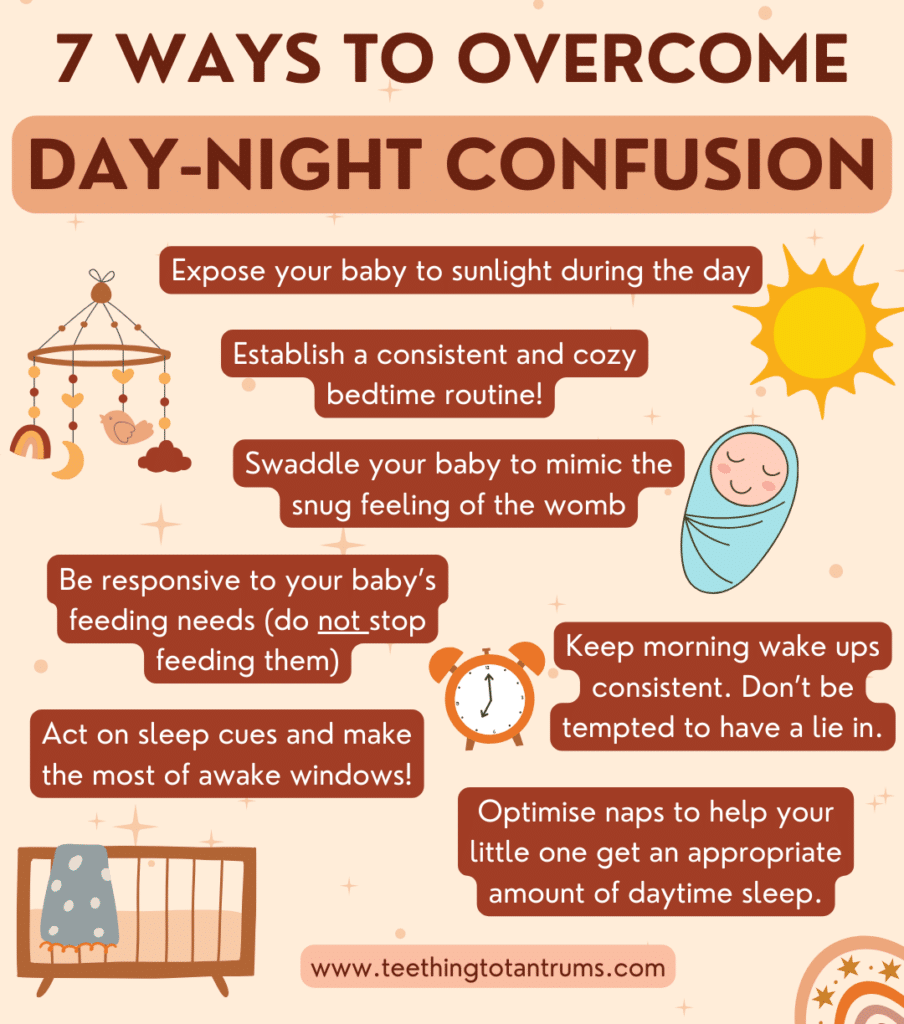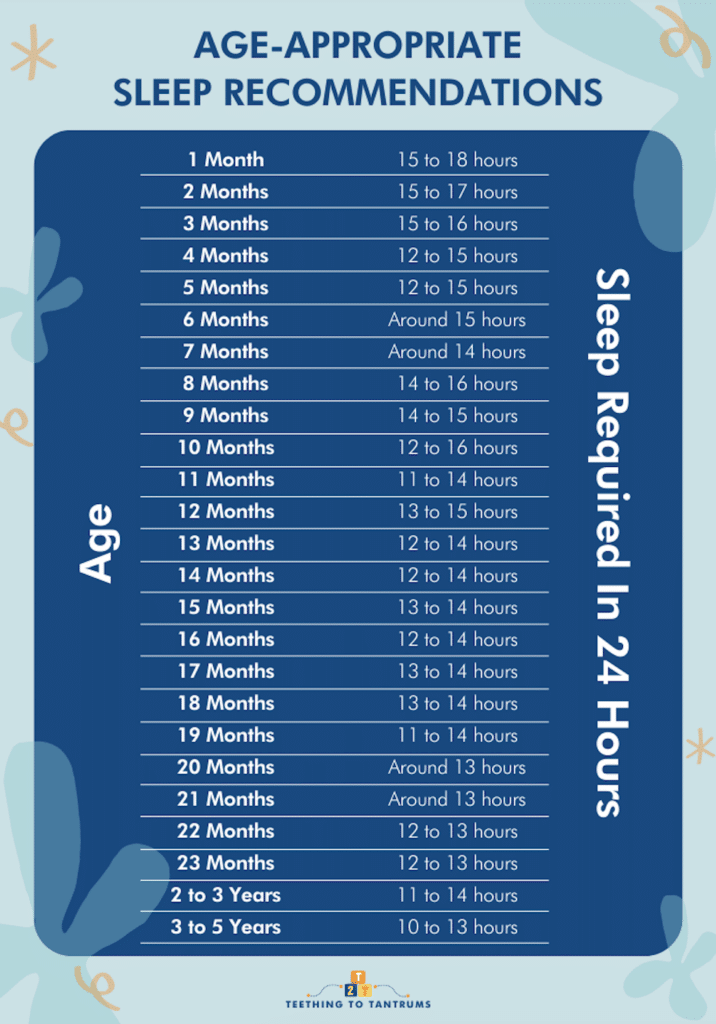Bleary-eyed and exhausted, you glance at the clock. It’s 3 am. Again. Your newborn is wide awake, cooing and kicking happily. But come morning, they’re ready to snooze away the bright sunshine.
Welcome to the upside-down world that is newborn day-night confusion.
The age-old conundrum leaves new parents desperately seeking some nighttime shut-eye.
The good news? This mixed-up sleep pattern is normal for babies fresh to life outside the womb. With the right approach, you can guide your newborn’s sleep rhythms back in sync.
In this guide, you’ll discover strategies to overcome your little night owl’s day-night disarray quickly and effortlessly.
Let’s dive right in.

Table of Contents
Key Takeaways
- Newborn day-night confusion is very common, caused by the baby’s undeveloped circadian rhythm that hasn’t synchronized to the 24-hour day/night cycle yet.
- Signs of day-night confusion include frequent night wakings, long daytime naps, difficulty settling at night, and overtiredness cues.
- Overcoming the confusion involves using cues like light exposure, consistent bedtime routines, managing awake windows, and optimizing day/night sleep amounts.
What Is Day-Night Confusion?
Day-night confusion is when your newborn’s sleep doesn’t align with the expected night and day cycle. It is most common in newborns because at birth, your baby’s internal clock, also known as the circadian rhythm, is not fully developed.
Pre-birth, babies have been living in the warm darkness of the womb, sleeping and waking as and when they please.
Once they are born this can continue and your baby may sleep and wake at irregular intervals with no recognition of whether it is day or night.
4 Signs Of Newborn Day-Night Confusion
So what are the signs that your newborn has day-night confusion? Here are some of the common indicators that your newborn might be experiencing this mix-up:
- Frequent waking at night: Newborns with day-night confusion may wake up more often during the night than in the daytime. This can disrupt their sleep pattern and yours. They might seem alert or ready to play rather than sleepy.
- Extended naps during the day: If your baby is sleeping for their longest stretches during daylight hours, they could be mistaking day for night. These extended naps can easily make your baby less sleepy at night.
- Difficulty settling at night: You may notice that your baby seems overtired at night but still struggles to fall asleep. This overtiredness is due to the reversal of their natural sleep rhythm.
- Signs of overtiredness: Newborns can easily become overtired if they are experiencing day-night confusion. Watch for tiredness cues such as yawning, rubbing of eyes, or fussiness. These are typical overtired baby behaviors indicating a disrupted circadian rhythm.
Understanding these signs can help you realize that you gently need to guide your newborn into a more traditional sleep pattern.
Looking to get your little one to sleep quickly and effortlessly? Check out my Bedtime and Nap Cheat Sheet and master the art of making daytime naps and bedtimes as seamless as possible.
A bedtime & nap cheat sheet so good your little one will ask you to put them to bed...
Laura Williams "This is a life saver! I'm so glad I downloaded your bedtime & nap cheat sheet. My little one actually asked me to put him to bed last night! Unbelievable! Thank you so much!"
Click Here For The FREE Cheat Sheet
When Does Day-Night Confusion Begin?
Typically, day-night confusion starts right after birth as your new bundle of joy has yet to understand the difference between day and night.
For some infants, this period of confusion may not be obvious at first, as some very young babies will sleep and wake for feeds at very regular intervals.
However, as they grow, a more recognizable sleep schedule should start to develop with longer periods of sleep at night and more wakeful periods during the day. But if this fails to present itself, then you are probably dealing with a case of day-night confusion.

My Experience With Newborn Day-Night Confusion
If you are reading this post and feeling frustrated that your newborn has day-night confusion, I can wholeheartedly identify with you.
My son had newborn day-night confusion when he first arrived and it was incredibly hard to manage.
I would struggle to keep him awake for any length of time during the day yet in the middle of the night, he was happy to gurgle away and showed great interest in the world around him.
Sadly, this was when my husband and I were at our most exhausted…
However, I want to reassure you that with the help of some gentle guidance and establishing sleep associations using the following tips, you’ll be able to get baby sleeping at night in no time at all.
And I promise you will be able to sleep again.
How To Overcome Newborn Day-Night Confusion
To gently guide your baby toward a more regular sleep-wake cycle with consistency and patience, implement the following tips. You may find you need to implement all of them, or after a couple, your baby will fall into a more natural sleep-wake cycle.
Regardless, remain consistent and patient in your approach. The more consistent you are, the faster the day-night confusion will be resolved.

- Begin by exposing your baby to daylight during waking hours to help regulate their internal clock. Engage with your baby during the day and keep the house bright. In the evening, dim the lights and reduce stimulation to naturally boost baby’s melatonin production, the hormone responsible for sleep.
- Establish a bedtime routine that may include a top and tail bath, a gentle massage, a cuddle, and reading a story. Repeat this routine every night before you put baby down for bed. Keep the room dark and warm. Use hushed voices and calming actions. This consistency signals to your baby that it’s time to wind down for the night.
- Swaddle your baby for nighttime sleep to mimic the snug feeling of the womb. Swaddling can provide a sense of security, reduce the startle reflex, and potentially lead to longer sleep periods.
- Be responsive to your baby’s feeding needs and make sure they are taking full feeds during the day because a well-fed baby is more likely to sleep better.
- Don’t be tempted to have a lie in: This can be hard especially if your little one is sleeping at 7 or 8 am and you have had a tough night…. However, encouraging your baby to start the day at around 7 am is a great way to help them balance their day-night sleep cycle quickly.
- Act on sleep cues and make the most of awake windows: Learn your baby’s sleep cues and act upon them to avoid overtiredness. You may be tempted to try and keep your baby awake during the day when they want to sleep but this can just make matters worse. Rather let them sleep and when they are awake ensure you are making these periods stimulating compared to low-key awake periods at night.
- Optimize nap times to ensure that your baby is getting enough rest during the day, but not so much that it interferes with nighttime sleep. If needed, wake your baby from a nap to make sure they are not getting too much daytime sleep. Aim for shorter, more frequent naps, and avoid letting your baby sleep for long stretches in the latter part of the day. Read my newborn sleep schedule here and look at this graphic to see how much sleep your baby needs in a 24-hour period:

How Long Does Newborn Day-Night Confusion Last?
Most newborns adjust their day-night confusion within a few weeks. Some may take just a few days, while others might need a bit longer.
It’s important for you to be patient during this time and remember that newborn day-night confusion is temporary.
If you’re feeling overwhelmed, you can consult with a pediatrician to provide you with personalized advice.
Likewise, you can talk to family and friends to hear their advice and to ask for help with nighttime wakings.
Sometimes a full night’s sleep can make all the difference.
TOP TIP: If your baby is waking frequently for feedings at night, gradually increase their daytime feedings. And if your baby is particularly sleepy during the day and falling asleep during daytime feeds… keep them awake to ensure they take a full feed by removing some clothes and tickling their feet.
Why Is Newborn Day-Night Confusion So Common?
Newborn day-night confusion is very common because a newborn baby’s internal clock is not yet synchronized with the 24-hour day.
In the womb, babies receive few external cues to distinguish night from day, as they’re enveloped in consistent darkness and comfort.
Then when your baby is born, they need to adjust to the world’s natural light-dark cycle.
During this adjustment period, which can last for several weeks, their sleep patterns can often be reversed. This is what we refer to as day-night reversal.
Frequently Asked Questions About Newborn Day-Night Confusion
In this section, you will find answers to common queries about your newborn’s sleep patterns, especially the mix-up between day and night.
Q: When can I expect my newborn to differentiate between day and night?
A: Your newborn might start to show a more predictable pattern of sleep by around 6 to 8 weeks. At this time, you may notice longer stretches of sleep at night. Remember, each baby is unique, so some might take a bit longer to adjust. Be patient; your newborn is just getting accustomed to life outside the womb.
Q: What strategies can help ease my 2-month-old’s day and night confusion?
A: To help your 2-month-old, try to keep them engaged and expose them to natural light during the day. At night, keep the lights dim and the environment quiet to signal that it’s time for sleep. Consistency is key, so maintain a regular feeding, playtime, and sleep schedule. This helps set their internal clock, making day and night more distinct.
Also, try not to let your baby sleep for too long during the day, especially in the lead-up hours to bedtime. A 2-month-old should be awake for 45 minutes to 1.5 hours before bedtime.
Q: How long typically does day and night confusion last in newborns?
A: Day and night confusion usually sorts itself out within the first few months of life. Most newborns start to adjust to a regular sleep-wake cycle by 3 to 6 weeks and have a more established sleep pattern by 3 to 4 months. If you’re concerned about your baby’s sleep habits, speak with your pediatrician. They can provide guidance tailored to your baby’s needs.
Q: Can breastfeeding influence my newborn’s day-night sleep cycle?
A: Breastfeeding on demand, both day and night, is important for your newborn’s development and nourishment. The frequent, nighttime feedings don’t establish day-night confusion.
As your baby grows, their stomach can hold more, and they’ll start to sleep for longer periods at night naturally. Keep nighttime feedings low-key though to encourage your baby to settle back to sleep quickly and appreciate that there is a difference between day and nighttime feedings.
Need More Parenting Help?
- Download our FREE Perfect Sleep Cheat Sheet. It’s a free, easy-to-use and proven formula designed for parents of 0-5 year olds to master the art of consistently undisturbed and restful sleep without the yelling, nagging or exhausting long-winded evenings.
- Check out our Parenting Toolbox. You’ll get access to expertly-chosen products that you can guarantee are the best for your little one and your wallet.
- Ready to create the calm, peaceful evenings you deserve? Then checkout our most popular course - The Bedtime Battles Masterclass

A bedtime & nap cheat sheet so good your little one will ask you to put them to bed...
Laura Williams "This is a life saver! I'm so glad I downloaded your bedtime & nap cheat sheet. My little one actually asked me to put him to bed last night! Unbelievable! Thank you so much!"
Click Here For The FREE Cheat Sheet


